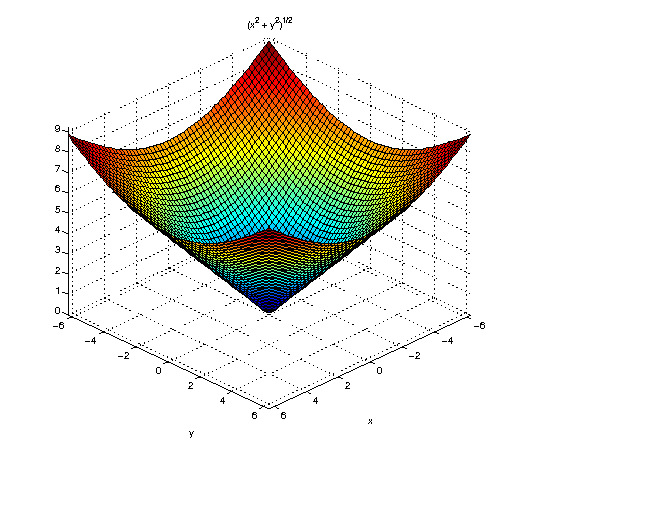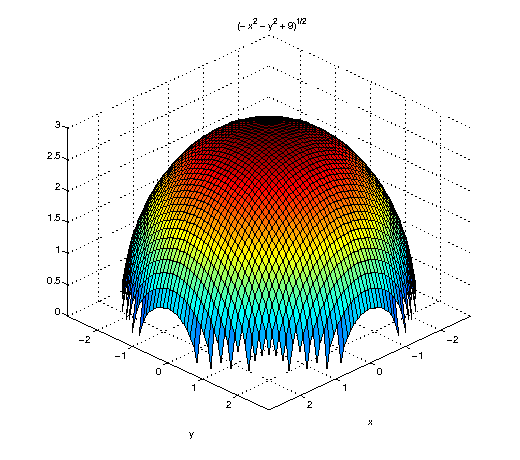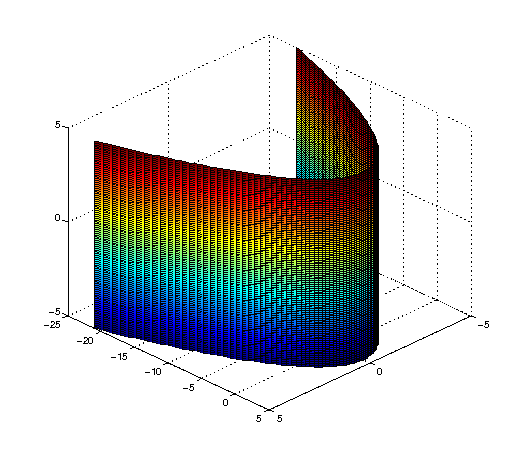clear all
syms x y; ezsurf(sqrt(x^2+y^2)) view([10,10,10])

ezsurf(sqrt(9-x^2-y^2)) view([10,10,10])

[xbunch,zbunch]=meshgrid(-5:0.1:5,-5:0.1:5);
f=4-x^2;
surf(xbunch,subs(f,{x,y},{xbunch,zbunch}),zbunch)
view([10 10 10])

diff(x*sin(x^2*y),x)
ans = sin(x^2*y) + 2*x^2*y*cos(x^2*y)
diff(diff((x^2-y)/(x+y),y),x)
ans = 1/(x + y)^2 - (2*x)/(x + y)^2 - (2*(y - x^2))/(x + y)^3
jacobian(x*log(x*y^2)+x*y,[x y])
ans = [ y + log(x*y^2) + 1, x + (2*x)/y]
subs(jacobian(5*x^3*y^2-y/x,[x y]),{x,y},{-1,0})
ans =
0 1
a=[2 -3];
dot((a/norm(a)),subs(jacobian(x^2+y^3,[x y]),{x,y},{2,-2}))
ans = -7.7658
f=(y-2)*log(x*y); [xsoln,ysoln]=solve(jacobian(f,[x y]))
xsoln = 1/2 ysoln = 2
So the solution above is just (1/2,2).
f=x^3+y^3-6*x*y; [xsoln,ysoln]=solve(jacobian(f,[x y]))
xsoln =
0
2
3^(1/2)*i - 1
- 3^(1/2)*i - 1
ysoln =
0
2
- 3^(1/2)*i - 1
3^(1/2)*i - 1
So the solutions above are (0,0) and (2,2). Ignore the complex.
clear all; syms x y L; f=x*y^2; g=x^2+y^2-16; firstpart=jacobian(f,[x y])-L*jacobian(g,[x y]); [Lsoln,xsoln,ysoln]=solve(firstpart,g) subs(f,{x,y},{xsoln,ysoln})
Lsoln =
0
0
(4*3^(1/2))/3
(4*3^(1/2))/3
-(4*3^(1/2))/3
-(4*3^(1/2))/3
xsoln =
4
-4
(4*3^(1/2))/3
(4*3^(1/2))/3
-(4*3^(1/2))/3
-(4*3^(1/2))/3
ysoln =
0
0
(4*6^(1/2))/3
-(4*6^(1/2))/3
(4*6^(1/2))/3
-(4*6^(1/2))/3
ans =
0
0
(128*3^(1/2))/9
(128*3^(1/2))/9
-(128*3^(1/2))/9
-(128*3^(1/2))/9
So the maximum is (128*3^(1/2))/9 at (4*3^(1/2)/3,+/-(4*6^(1/2))/3) and the minimum is -(128*3^(1/2))/9 at (-4*3^(1/2)/3,+/-(4*6^(1/2))/3).